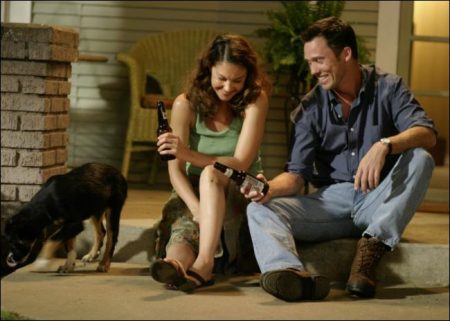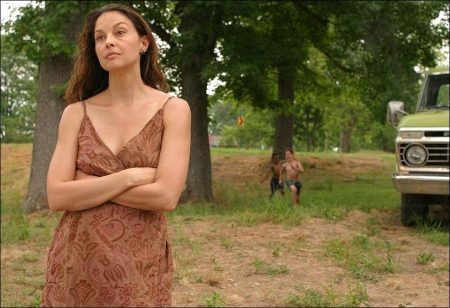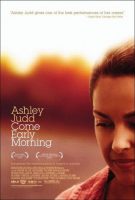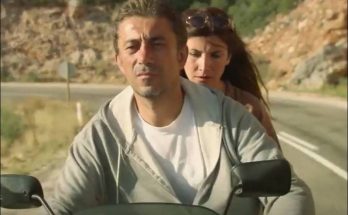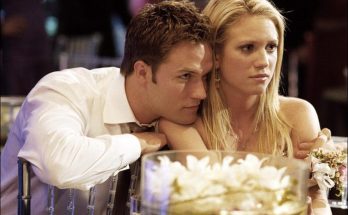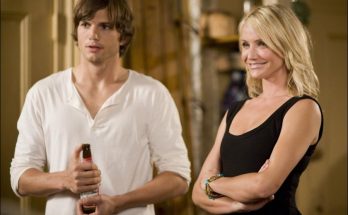Taglines: Before you fall in love, you need to love yourself.
Come Early Morning tells the story of Lucy (Ashley Judd), a hard-working, Southern woman, whose personal life has been reduced to a spiral of late nights and one-night stands. When Lucy meets Cal (Jeffrey Donovan), a newcomer to town, she is finally forced to confront her fears as he challenges her accept a more meaningful relationship. Lucy must decide whether to push Cal away or face the demons that have left her incapable of intimacy and growth. She begins a spiritual journey toward love and redemption that takes her, and the film, to an entirely unexpected and original place.
Ashley Judd stars in Come Early Morning, an official selection at the 2006 Sundance Film Festival, which marks the writing and directing debut of GoldenGlobe-nominated actress Joey Lauren Adams’(The Break-Up, Chasing Amy). The film, which draws loosely on Adams’ own experiences of growing up in the South, is infused with an insider’s knowledge of life in a small town.
Come Early Morning is a 2006 film starring Ashley Judd and Jeffrey Donovan. It marked the directorial debut of Joey Lauren Adams. The movie was shot throughout the metropolitan Little Rock, Arkansas area including Pulaski Heights, and Adams’ hometown of North Little Rock. It premiered for wide release in Little Rock on December 14, 2006.
The film received generally favourable reviews with an “83% fresh” rating on rottentomatoes.com and a score of 64 on Metacritic Reviewers found Joey Lauren Adams’ directing to be a good debut, and praised Ashley Judd’s performance.
A Conversation with Director / Writer Joey Lauren Adams
What inspired you to create Come Early Morning?
I wrote the script originally as an outlet for the frustrations I was having as an actress and the roles that were available to me. Also, I found myself becoming self-destructive during my down time between films because I was in the position of waiting to be wanted and of being bored.
Writing gave me a place to be constructive and a right to bitch. After I finished the script, and after I figured out I liked it, I realized that I wanted to pick the cast, the locations, the music, the crew, etc. I couldn’t stand the idea of someone else interpreting the story and I knew it wasn’t the kind of script that someone would necessarily want to interpret. I wanted to get the movie made the way I saw it in myself, so necessity, you could say, forced me to direct.
Will you describe the genesis of the project up to and including your first day on set?
It took five weeks to shoot what I had spent five years trying to finance. I’m still struggling with that one. I had never been behind the camera, but I had 15 years of set experience as an actress. I knew how important it was to get a good crew.
I got an amazing crew. We shot in my hometown of North Little Rock, Arkansas, which lent a degree of comfort. I had an unbelievably talented actress, Ashley Judd, playing the role I had originally written for myself. The night before our first day of shooting I was trying to play out the next day’s events in my head. 1) Arrive on set. 2) Get out of car. 3) … and I was already stuck. As an actress, I knew the routine: find your trailer, then find the make-up trailer, and then wait to be called to set. As a director, I had no idea where to go. In a panic, I called Tim
Orr, our cinematographer, and tried to act cool as I asked, “So when I get to set in the morning, um, where should I go?” He was kind and said, “Just find me.” Throughout the shoot, whenever I was unsure of what to do, I would just find someone who did.
What films and / or directors inspired you during the making of COME EARLY MORNING?
Bruce Beresford’s, TENDER MERCIES was the template for the film. I showed it to everyone involved. I’ve always admired its achievement in telling a story in the most simple and honest way. The combination of Horton Foote’s writing with the acting, production design, cinematography, music, and sound design all lend to this.
Also, URBAN COWBOY had a huge influence. It seemed to me the actors were never commenting on the people they were portraying. Instead, they were just being. It was so important that COME EARLY MORNING not be a caricature of Southern culture, but instead an honest view of a very real people and places.
Why was Ashley Judd your first choice to play Lucy?
I thought Ashley got the whole Southern thing in a very real way and she also seemed to have truly lived life, searching to understand it intellectually, emotionally, and spiritually. There’s a depth to her. When we met, there was just immediately a connection and I knew she got it. There seemed to be a trust between both of us. We didn’t really talk a lot about the movie or her character.
We talked about where we were in our lives on a personal level, which with this film, we both had to bring to the table. While shooting, I was constantly amazed by her talent and commitment. There is not one false note in her performance.
Very few films today are driven by female protagonists. Do you think COME EARLY MORNING will appeal to women in particular?
I can’t help but wonder that if Lucy was, let’s say a guy named Leonard, would one argue COME EARLY MORNING is a “man’s movie?” It’s the story of a human being struggling with the universal themes of love – or lack thereof, including love for oneself. It would be a huge disappointment for me if the film were to be labeled a “chick flick” simply because the story follows a woman. In fact, I think Lucy possesses several of what would typically be described as male qualities. She is complex.
Lucy’s journey is marked by small but significant moments that lend resonance to the story.
I wanted the story to be true to my experiences in life. I haven’t had any huge epiphanies. It’s been much more gradual.
What did Jeffrey Donovan bring to the role of Cal?
I had a very specific idea about who Cal was. Jeffrey came in and auditioned and I thought, “That’s Cal.” He had a confidence that seemed to come as a result of having been there, a certain maturity and patience and an ability to roll with whatever was happening. Cal’s not judgmental, he simply responds to however Lucy presents herself – he acts as a mirror. He sleeps with her when she’s drunk but he’s also there when she’s looking for something more intimate. Jeffery was able to pull this off in a very real way while at the same time honestly portraying Cal’s own complexities and boundaries.
How is Lucy’s relationship with her family essential to understanding her character?
In the film, Lucy is forced to deal with the effects her family has had on her perspective. Certain failures of her father and her grandparents have been passed down and Lucy, exhausted from the struggle, is forced to look at how she has chosen to carry these failures as burdens and ultimately how she should lay them down.
Religion also is a major theme throughout the film…
When pitching the script, I wasn’t allowed to speak of the religious content – not a good sell – and I’m hesitant to speak of it now for fear of sounding dogmatic. The holy thread throughout the story is simply my adult interpretation of the particular religious semantics I happened to be raised with and how I understand them to be true. I just wanted to address it in a very subtle way. There are positive messages in the Bible. It’s just depends on how you translate them. Feel free to draw your own conclusions.
Clearly, setting is a major element in COME EARLY MORNING.
We shot mainly in North Little Rock as well as Little Rock, Lonoke and some of the surrounding counties. It was important to me to shoot in Arkansas because it’s not Faulkneresque or the antebellum South of GONE WITH THE WIND. And it’s not the Texas of Ry Cooder. It is a very specific place with a very specific feel that I wanted to capture on film. I also wanted the actors to experience it so they could bring it to their characters.
Will you describe the aesthetics of COME EARLY MORNING? How did you want the film to look?
Although the film is contemporary, I wanted it to feel more 70’s in order to give a sense of the characters being stuck in the past. There are no cell phones in the script, a lot of the cars are older models, and the colors are very muted.
As far as the cinematography, I knew we couldn’t overpower the story. I saw GEORGE WASHINGTON years ago and immediately I wanted Tim Orr. He has a very natural style and an ability to shoot simply and still seem interesting. He understands the delicate motivation of movement. He’s also great at conveying sense of place and turning that place into a character. I knew even if we never spoke, I would love the way the film looked. It was incredible to work with that kind of trust, especially since I knew cinematography wasn’t my strength.
How did you use music to tell the story?
There is both conscious and unconscious music in the film – the obvious being the score and the tunes that play throughout, mainly off two jukeboxes that have significant roles in the story. The old jukebox represents Lucy’s stagnation and her inability to let go, the new one, change. But on a much more subtle level, I think that like most writers I listen to music while working. I pick songs that equate certain emotions; those emotions translate into the scenes, and I believe remain there. Theft or inspiration? Many thanks to those who will never know their music is in the film.
Come Early Morning (2006)
Directed by: Joey Lauren Adams
Starring: Ashley Judd, Jeffrey Donovan, Laura Prepon, Diane Ladd, Scott Wilson, Ray McKinnon, Tim Blake Nelson, Candyce Hinkle, Ritchie Montgomery. Nancy Wilder, Wally Welch
Screenplay by: Joey Lauren Adams
Production Design by: Max Biscoe
Cinematography by: Tim Orr
Film Editing by: Meg Reticker
Costume Design by: Lee Hunsaker
Set Decoration by: Anuradha Mehta
Music by: Alan Brewer
MPAA Rating: R for language and some sexual situations.
Distributed by: Roadside Attractions
Release Date: November 10, 2006
Visits: 46
